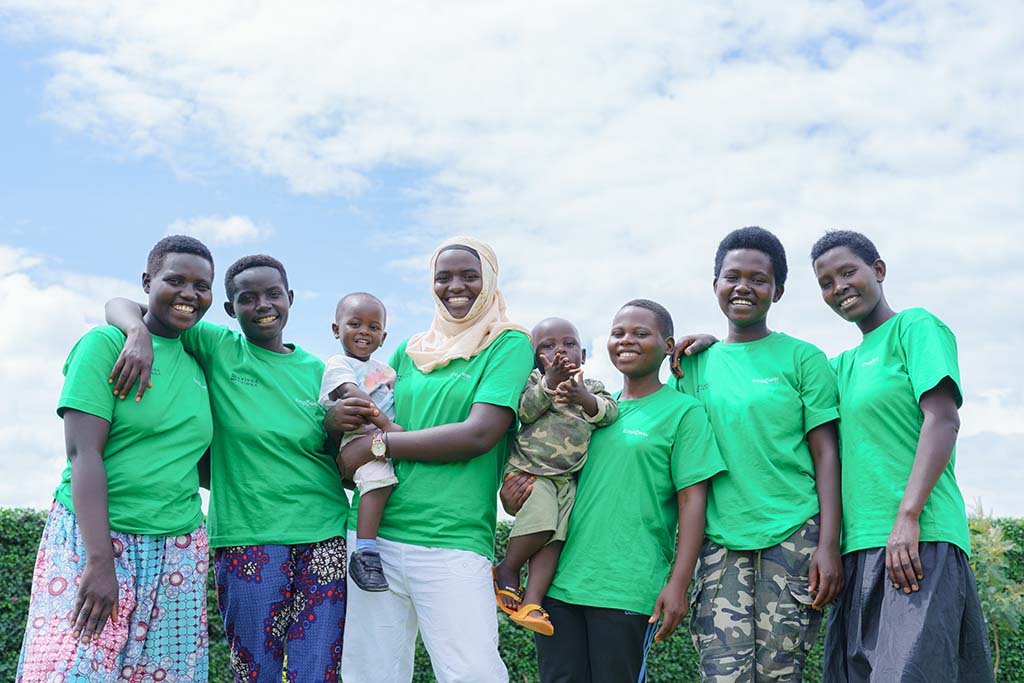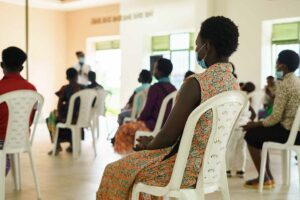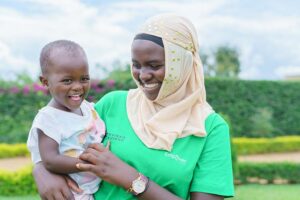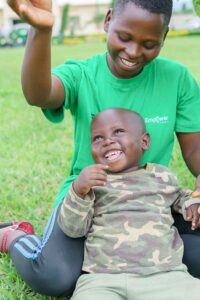Teen mothers learning and healing together
Learning that they are not alone. Gaining a voice and being able to return to school. That is some of the things Empower Rwanda’s programme to support young mothers from poor families has meant for the participating girls.

The assembly hall is spacious and airy, the shade providing a welcome relief from the sun outside. Spread out across the room are white plastic chairs. About 30 young mothers are waiting for their training on sexual and reproductive health and rights (SRHR) to start. Some are holding small babies in their arms. Others occasionally have to chase after slightly older children who are in search of more exciting adventures.

Young mothers in Nyagatare district in Rwanda, attending a training session on sexual and reproductive health and rights. Photo: Gloria Powell
Alphonsine Nyiramana takes the floor. She’s a trainer on SRHR and usually holds these sessions once a week at the health centre. Now, Alphonsine has been invited by Kvinna till Kvinna’s partner organisation Empower Rwanda as part of their empowerment programme for young mothers. This day she will, among other things, cover family planning, contraception, STDs, and safe abortions.
“I love working with youth,” says Alphonsine. “To be able to see their development. It is such important work.”
Not enough knowledge
Alphonsine explains that many of the girls that used to be very shy are now confident enough to ask all the “embarrassing” questions they have. When she first started seeing them, they did not have an adequate sex education.
“Many have said that they might not even have gotten pregnant if they had had this information before,” says Alphonsine.
This is confirmed by one of the participants, 17-year-old Pauline:
“We used to be vulnerable and helpless,” she says. “Now we know more, we have a voice and are able to teach others in our communities.”
Becoming accepted again

Janneti together with her 1-year-old daughter. Photo: Gloria Powell
Teenage girls who get pregnant without being married are subjected to a lot of shame and stigma in Rwanda. They have to drop out of school to give birth and lose their social network. Some are even thrown out of their parents’ house and left without any support. This is something Empower Rwanda works to change.
“Empower Rwanda helped me become accepted in my family again. They have taken me back in and, in a couple of months, I’m going back to school,” says Julienne, who is 17 years old.
“The best part about joining the programme was learning that I was not alone and that there were other girls in my situation,” says Janneti, also 17 years old. “My life has completely changed. I was beaten at home and my parents didn’t let me into the house. Now they have welcomed me back.”
“Healing and sisterhood”

Pacifique together with her 1,5-year-old son. Photo: Gloria Powell
Pacifique, 17, who is at the training session with her 1,5-year-old son, also describes her participation in the programme as a journey of healing and sisterhood.
“It has changed how I feel about myself. I have more dignity. And thanks to the training of our parents, I am able to go back to school. They now treat me and my son well,” she says.
Clarisse, 17, who learned about Empower Rwanda through her local health centre, feels that she herself is now able to be a better parent:
“My child will not go through what I went through,” she says.
Receiving health care
Empower Rwanda works closely together with local health and police authorities (many girls become pregnant after rapes), to be able to provide the girls with the health care and justice services they have the right to as citizens of Rwanda.
“A very important result of the programme is that now most of the girls have been tested for HIV and know their status—if they needed treatment, they have begun that. Some have also started using contraceptives and those that were pregnant have been able to receive proper maternal health,” says Alphonsine.
Covering large areas
But there are still challenges remaining.
“These are huge sectors geographically, so these girls come from very far away and many have to walk. It’s hard to be able to participate when you have to walk for hours with a hungry and tired child,” says Alphonsine.
Transportation back and forth can cost about RWF 6,000 (approximately USD 6) which is a large sum when you come from a family living in poverty. However, Empower Rwanda supports their participants with small allowances for transportation, to enable more girls to join in. They are also looking for ways to bring their activities even closer to the communities.
Kvinna till Kvinna has supported women’s rights in Rwanda since 2017. Since June 2021, we have supported Empower Rwanda in a project called ”Her Voice, Her Right”. Through this, Empower Rwanda reaches 400 teen mothers in Gatsibo and Nyagatare districts, among the poorest in the population of Rwanda.